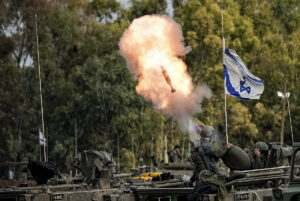Gaza war offers the ultimate marketing tool for Israeli arms companies

Israeli soldiers fire mortar shells toward targets in the Gaza Strip near the Gaza fence, 3 January 2024
Sophia Goodfriend reports in +972:
In late November, the Israeli defense tech start-up Smartshooter posted a grainy photo on Facebook showing three Israeli soldiers aiming assault rifles at a blasted-out concrete building somewhere in the Gaza Strip. The caption reads: “The SMASH 3000 is now in action with the IDF Special Forces of Sayeret Maglan, transforming Close Quarter Combat (CQC) scenarios!” In an interview published by Ynet a month later, the company’s CEO, Michal Mor, framed Israel’s war on Gaza, which has killed almost 30,000 Palestinians, as a sales boost. “This is the finest hour of the defense industries,” Mor said.
This optimism about Israel’s military-technological prowess was strikingly out of sync with the failure of Israel’s military apparatus on October 7. For years, military heads have married Israeli military strategy to speculative futures, promising that better weapons and surveillance technologies would provide more security down the line. But none of the army’s supposedly state-of-the-art systems were able to prevent Hamas’ breach of the fence encaging Gaza nor the massacres that ensued.
Among leaders of Israel’s defense community, the horrific and tragic violence seemed to force, at least initially, a reckoning with the army’s overreliance on high-tech systems. Yet it appears that this reckoning has quickly run its course: no lasting changes to Israel’s military-industrial complex seem to be in store.
The Israeli army is once again marketing itself as a high-tech superpower, talking up the automated weaponry and supercomputing surveillance tech being “battle-tested” in its war on Gaza. Military spokespeople hope the same old slogans will distract from the fact that Israel is far from achieving its stated goals of eliminating Hamas and bringing the remaining hostages home, despite this being one of the most destructive military campaigns in modern history. As investors drop cash on Israeli weapons start-ups at faster and faster rates, defense tech CEOs are poised to be this war’s only victors.
